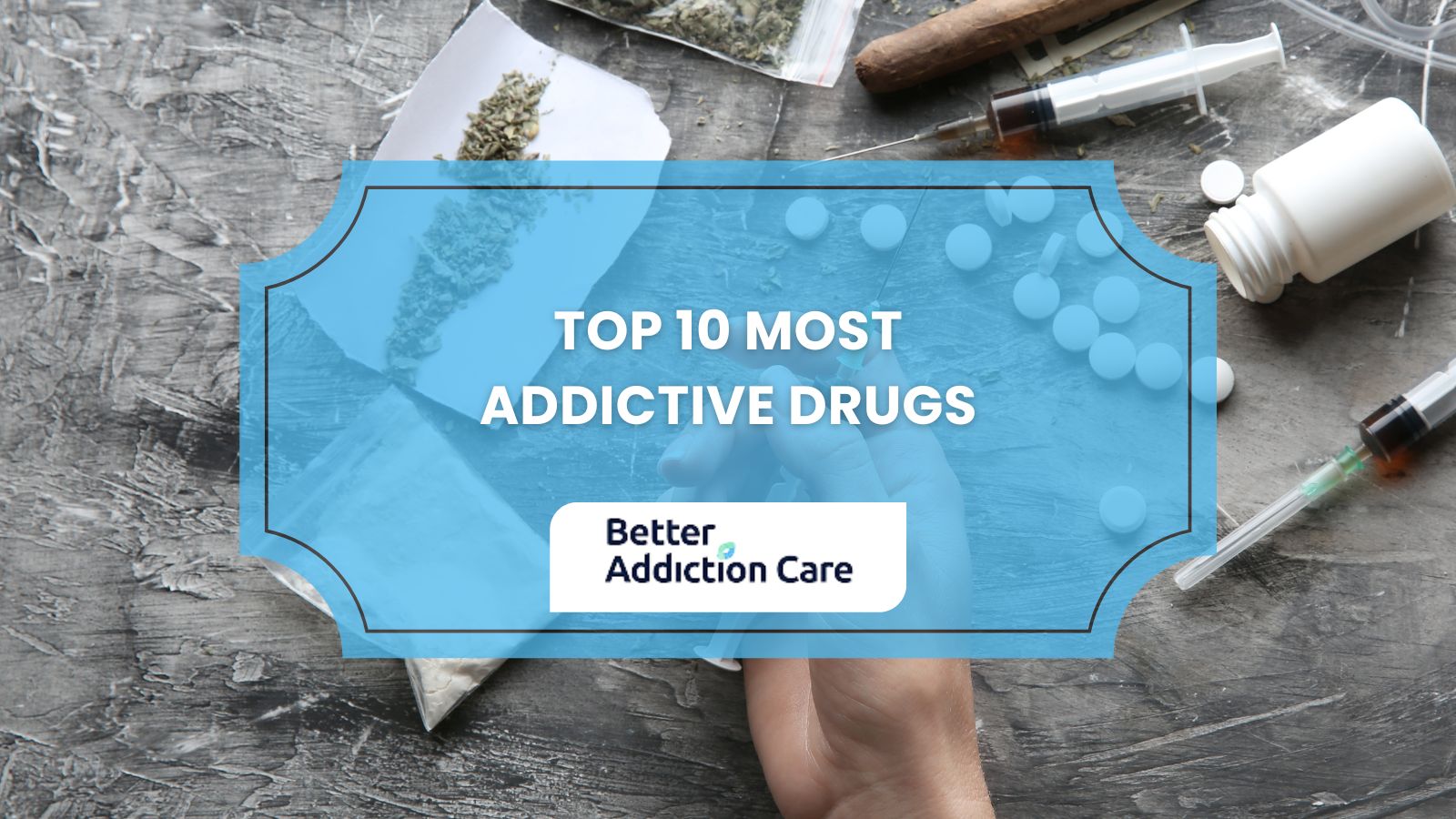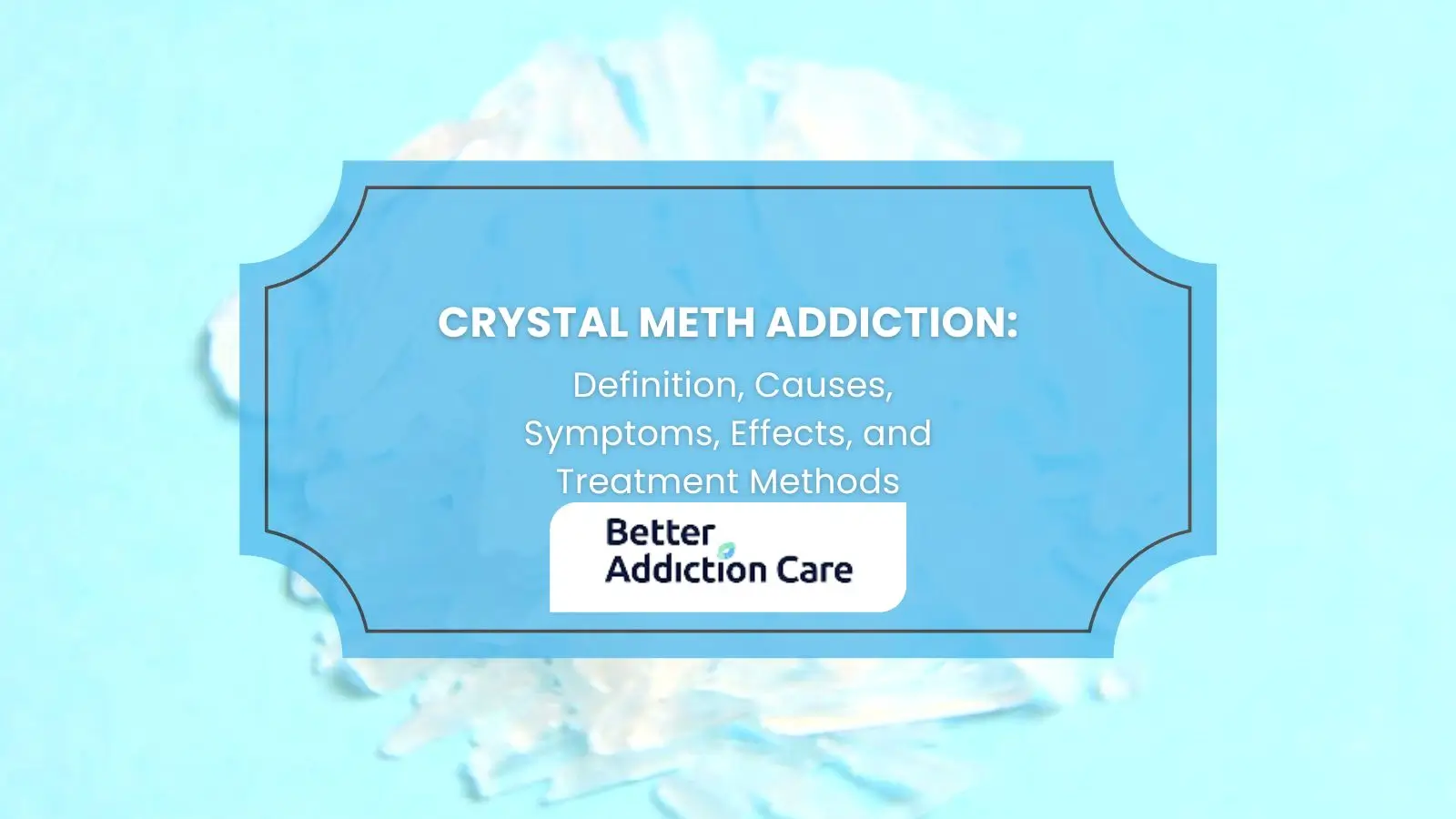Xanax (Alprazolam) Addiction: Definition, Symptoms, Causes, Side Effects, and Treatment
1 in every 311 emergency department visits related to prescription misuse involves alprazolam. This highlights the seriousness of Xanax (alprazolam) addiction, which starts when people take more than prescribed or use it without a prescription, leading to abuse. Alprazolam's widespread availability, with over 48 million prescriptions in the United States in 2013, combined with its unique pharmacological properties, creates a perfect storm for misuse, leaving devastated lives and families in its wake.
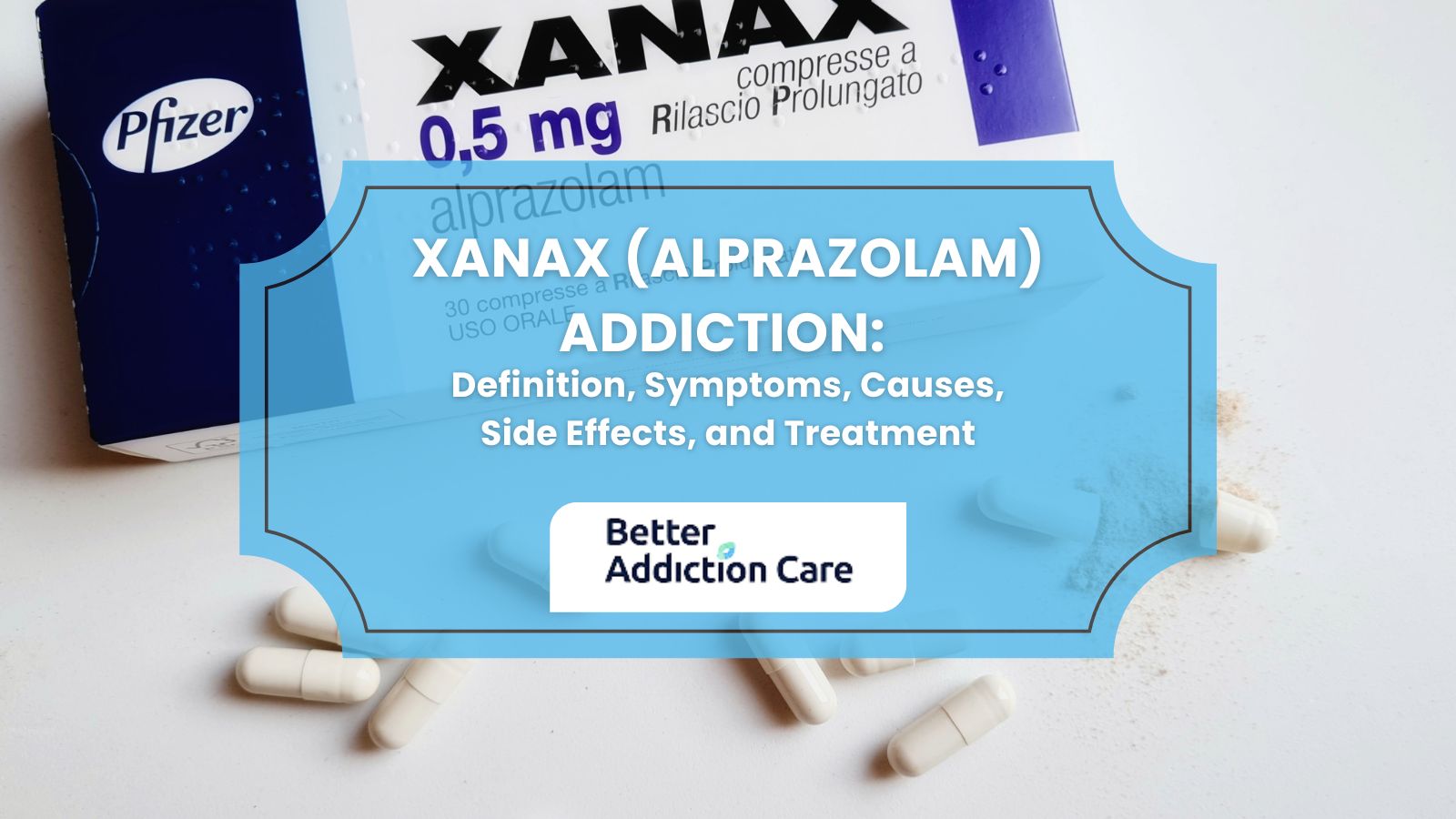
The main symptoms of Xanax addiction are anxiety when not using the drug, impaired coordination, strong cravings, drowsiness, slurred speech, and lying to get more prescriptions. The key causes of Xanax addiction are prescription misuse, recreational use, and co-occurring mental health disorders.
Xanax (alprazolam) addiction leads to several side effects, including social withdrawal, financial problems, paraphernalia, legal issues, and overdose or death in extreme cases. CDC data shows alprazolam-related deaths increased by 234% between 2003 and 2009, the highest increase among all benzodiazepines.
Treatment options include medical detoxification, cognitive behavioral therapy, medication, gradual tapering, support groups, and inpatient treatment.
What is Xanax Addiction?
Xanax addiction, or alprazolam dependence, is a substance or benzodiazepine use disorder that involves the compulsive need to use Xanax despite facing its harmful effects. Research published by the National Institutes of Health explains that the leading cause of Xanax addiction is its calming effect, where long-term use alters brain chemistry and leads to dependency.
Young adults are the most likely to use alprazolam or similar drugs like lorazepam non-medically, according to the 2013 National Survey on Drug Use and Health. 10.3% of individuals aged 18-25 reported misuse, nearly double the rate of those aged 26 and over (5.7%). In 2011, the Substance Abuse and Mental Health Services Administration (SAMHSA) reported that more than half of the nearly 176,000 emergency room visits for benzodiazepines involved alcohol or other drugs.
What Are The Signs & Symptoms of Xanax Addiction?
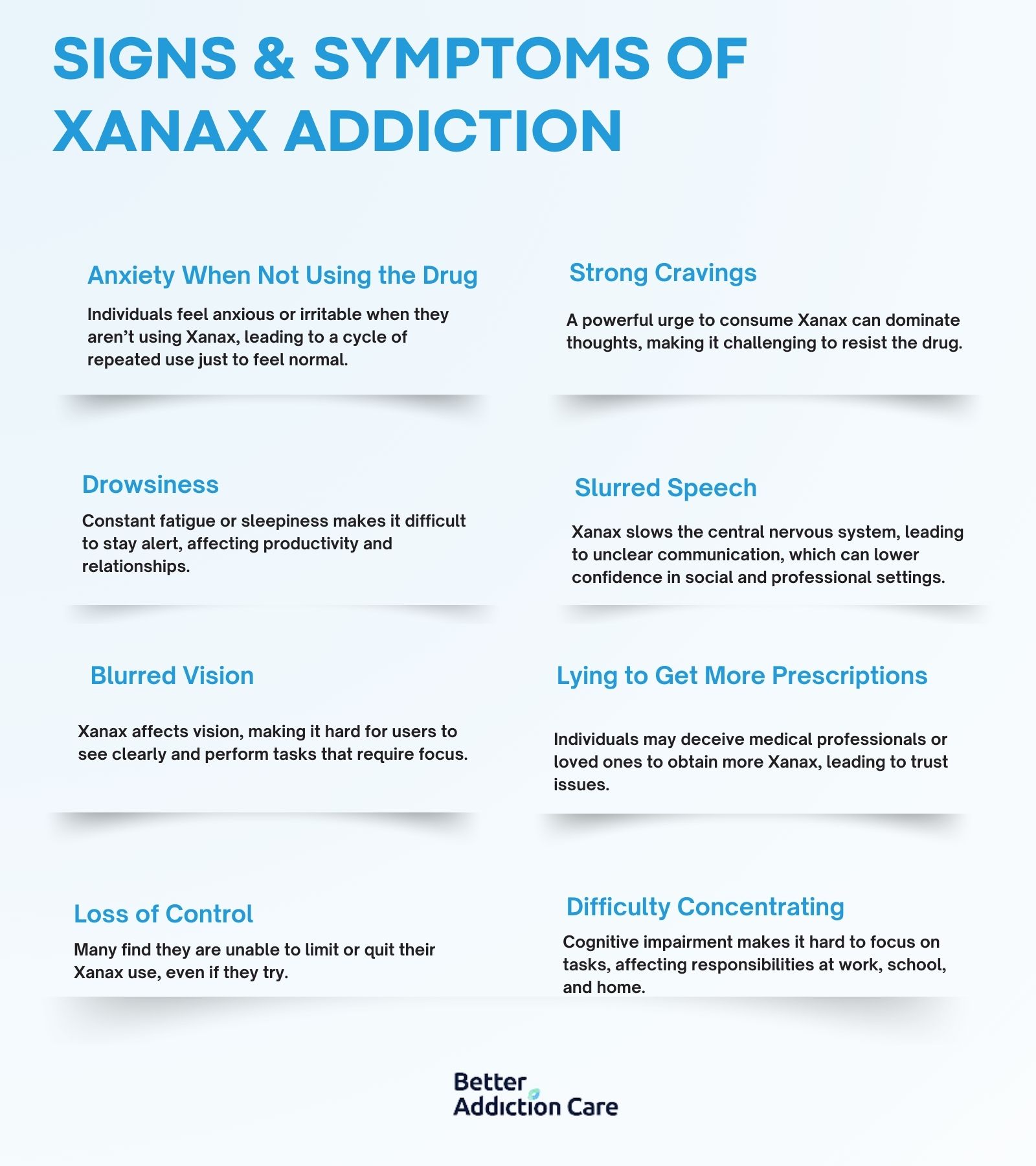
The signs and symptoms of Xanax addiction are anxiety when not using the drug, strong cravings, drowsiness, slurred speech, blurred vision, lying to get more prescriptions, loss of control, and difficulty concentrating.
These signs and symptoms are listed below.
-
Anxiety When Not Using the Drug: Individuals with Xanax addiction feel anxious or irritable without the drug, leading to a cycle of use to feel normal.
-
Strong Cravings: Addicted individuals have an intense need to consume Xanax and struggle to think of anything else.
-
Drowsiness: Xanax causes constant fatigue or excessive sleepiness, making it hard to stay alert and complete daily activities.
-
Slurred Speech: Xanax slows the central nervous system, making it difficult to communicate clearly and affecting personal and professional interactions.
-
Blurred Vision: Regular Xanax use causes blurred vision, making it hard to see clearly and perform daily visual tasks.
-
Lying to Get More Prescriptions: People with Xanax addiction lie to medical professionals or loved ones to obtain more of the drug, causing trust issues.
-
Loss of Control: Individuals take more Xanax than intended, even when trying to cut back or quit.
-
Difficulty Concentrating: Xanax affects cognitive functions, making it hard to stay focused on tasks and interfering with work, studies, or personal responsibilities.
What Are The Causes of Xanax Addiction?
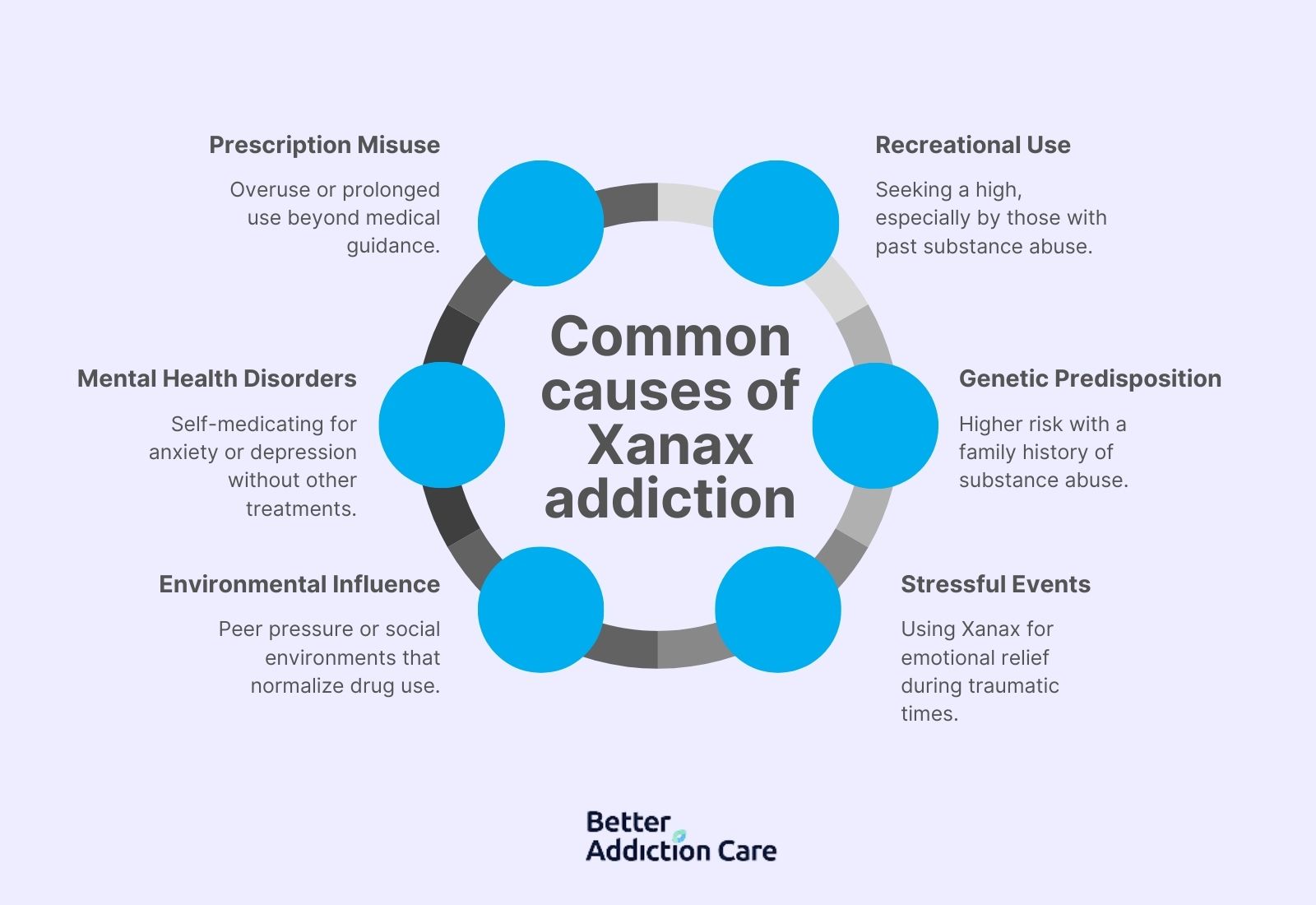
The main causes of Xanax addiction are prescription misuse, recreational use, co-occurring mental health disorders, genetic factors, environmental factors, and stressful life events.
These causes are explained below.
-
Prescription Misuse: Many individuals initially get Xanax (alprazolam) through a prescription but misuse it by taking higher doses than prescribed or using it for longer than directed, according to a study published by the National Library of Medicine.
-
Recreational Use: Some people, especially those with a history of substance abuse, use Xanax recreationally to get high. Recreational use leads to addiction, requiring larger doses to get high again and again.
-
Co-occurring Mental Health Disorders: Individuals with anxiety, depression, or other mental health conditions turn to Xanax for relief, according to Tzu-Ting Chen, Chih-Hung Ko, and Shao-Tsu Chen in their study published in the Journal of the Formosan Medical Association. The relief effects of Xanax lead to addiction, especially if mental health disorders are not managed through therapy or other treatment options.
-
Genetic Factors: Genetic factors play a significant role in benzodiazepine addiction, including Xanax. Individuals with a family history of substance abuse have a higher risk of developing a Xanax addiction due to inherited traits, according to the study “Genetic and psychosocial factors for benzodiazepine addiction.”
-
Environmental Factors: Environmental factors like social gatherings and peer pressure influence substance use. Individuals living in environments where drug use is common are more likely to experiment with Xanax and develop an addiction.
-
Stressful Life Events: Stressful life events like trauma or loss drive individuals to seek relief through substances like Xanax. Taking Xanax (alprazolam) for relief quickly becomes a necessity and leads to increased usage and addiction.
What Are The Side Effects of Xanax Addiction?
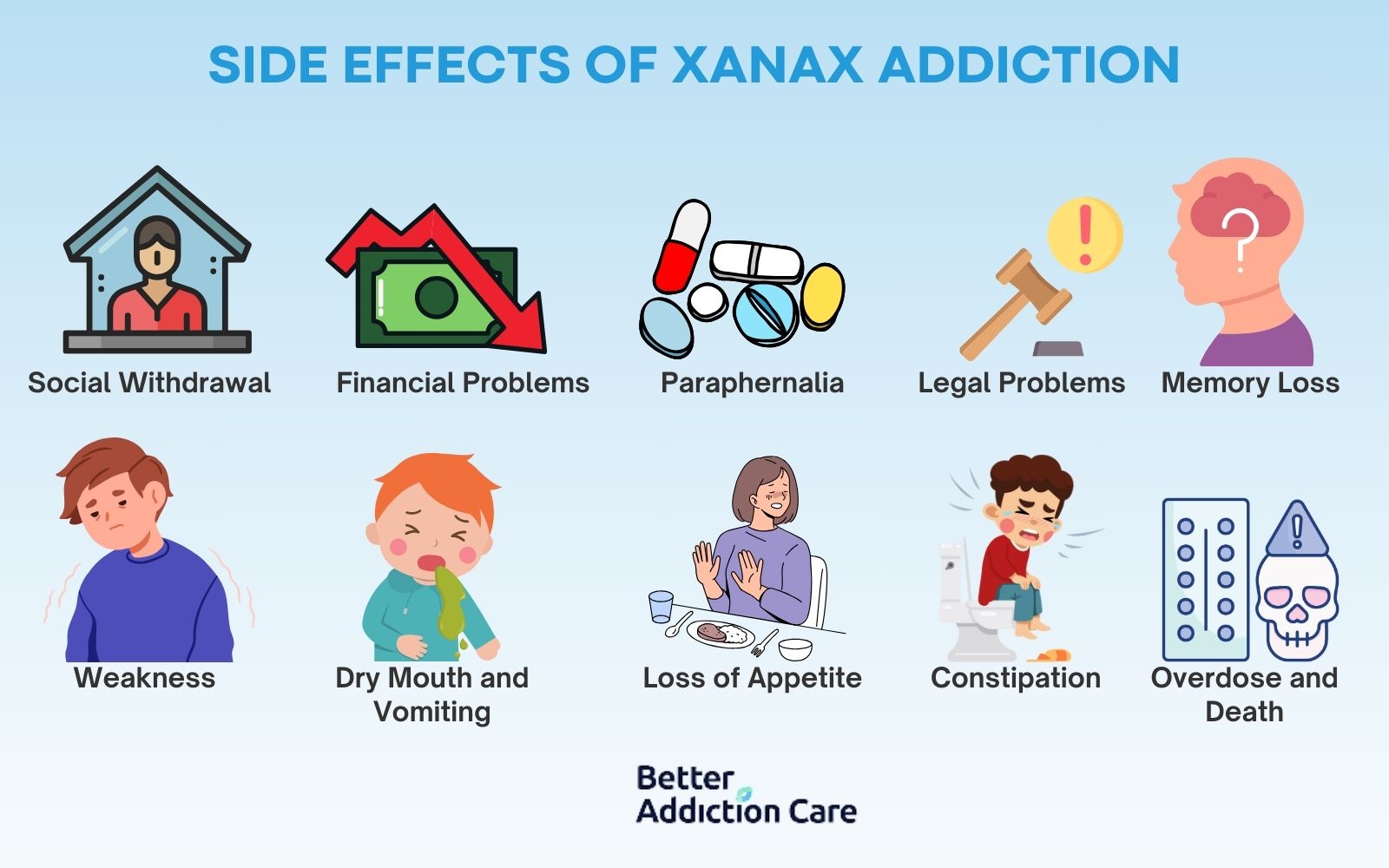
The possible side effects of Xanax include social withdrawal, financial problems, paraphernalia, legal problems, weakness, dry mouth & vomiting, loss of appetite, constipation, memory loss, suicidal thoughts, overdose, and death.
These side effects are listed below.
-
Social Withdrawal: People with Xanax addiction begin to isolate themselves from friends and family and prefer to spend time alone. They usually have feelings of shame, anxiety, or depression associated with their addiction.
-
Financial Problems: The cost of obtaining Xanax leads to financial strain, according to the study “Prescription Sedative Misuse and Abuse.” Individuals spend huge amounts on prescriptions to get the drug, which leads to debt and financial instability.
-
Paraphernalia: Paraphernalia refers to any equipment or items indicating drug use, such as pill bottles. The presence of such items and getting caught further isolates the individual.
-
Legal Problems: Legal issues, such as arrest and criminal charges, are possible when you engage in illegal activities to get Xanax. These illegal activities usually include purchasing the drug from unregulated sources and forging prescriptions.
-
Weakness: Long and unnecessary use of Xanax (alprazolam) leads to physical weakness and makes everyday activities more difficult. Individuals will always feel fatigued or lethargic.
-
Dry Mouth and Vomiting: Xanax in high doses leads to dry mouth and makes it difficult to speak or swallow. Some people experience nausea and vomiting, which affects their appetite and hydration levels.
-
Loss of Appetite: Many individuals taking Xanax experience a reduced desire to eat. The loss of appetite leads to weight loss and nutritional deficiencies.
-
Constipation: Benzodiazepines such as Xanax slow down the digestive system and lead to constipation, according to Tetsuya Ueki and Mikiro Nakashima in their study “Relationship Between Constipation and Medication.”
-
Memory Loss: Regular use of Xanax impairs short-term memory and people find it hard to remember recent events or learn new information, according to H V Curran, H Noshirvani, I M Marks, and M Başoğlu in their study “Long-term effects of alprazolam on memory.” Cognitive impairment impacts daily life and responsibilities.
-
Suicidal Thoughts: Xanax addiction leads to increased feelings of hopelessness and suicidal thoughts, especially in people with pre-existing mental health disorders, according to the study “A Case of Suicidal Thoughts With Alprazolam.” Suicidal thoughts are serious and require immediate attention.
-
Overdose and Death: Taking Xanax in excessive amounts leads to overdose, which is life-threatening, according to Luke O'Regan, David Sibbritt, and Ian M Whyte in their study “Alprazolam is relatively more toxic than other benzodiazepines in overdose.” Combining Xanax with other depressants, such as alcohol, leads to serious consequences as well.
What Are The Treatment Options for Xanax Addiction?
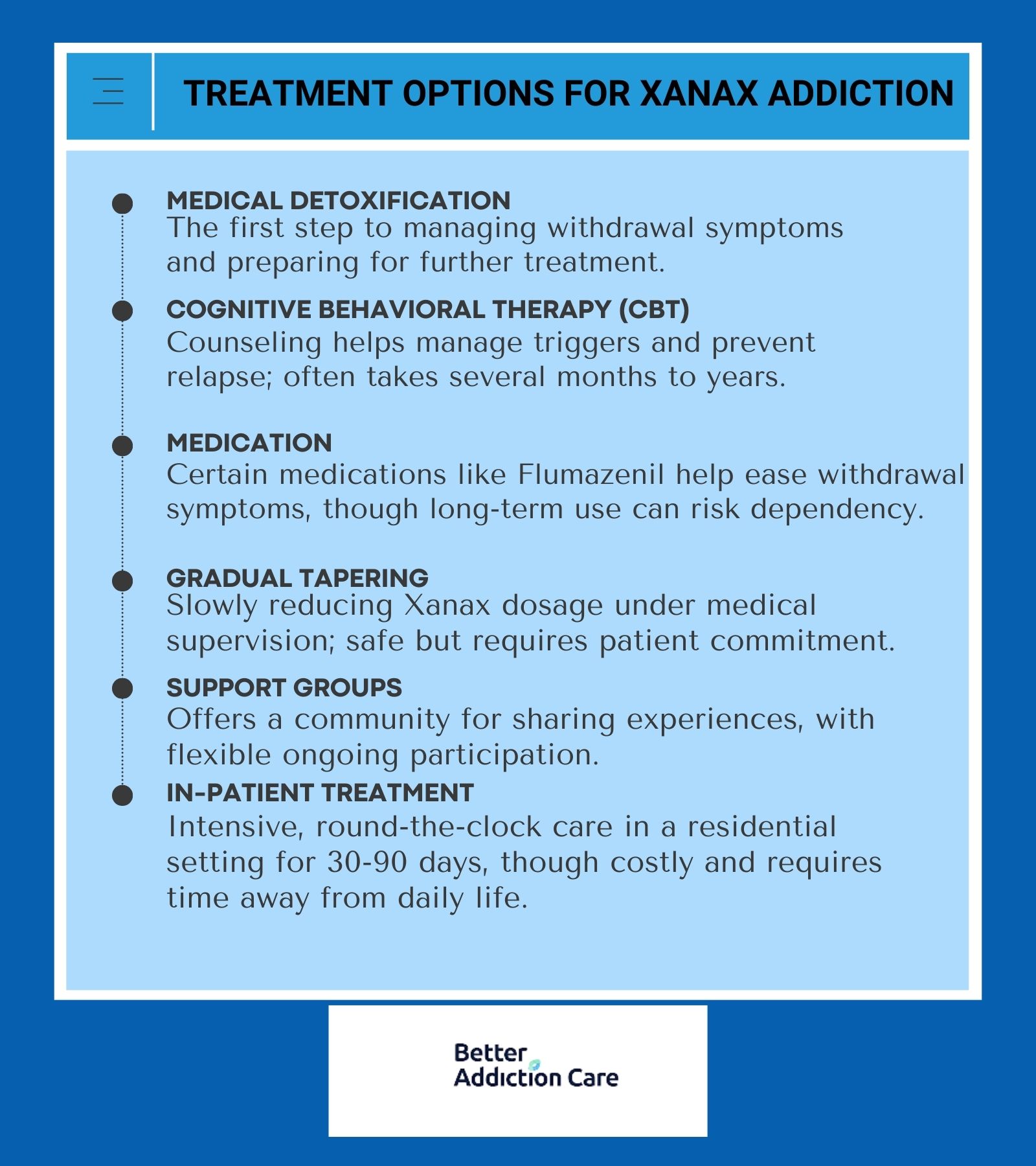
The treatment options for Xanax addiction include medical detoxification, cognitive behavioral therapy, medication, gradual tapering, support groups, gradual tapering, and inpatient treatment.
These treatment options for Xanax (alprazolam) addiction are explained below.
-
Medical Detoxification: Medical detoxification for alprazolam typically involves a gradual reduction of the medication, with protocols such as decreasing the dose by 25% every four days shown to be effective in minimizing withdrawal symptoms and supporting recovery, as demonstrated in a hospital case where detoxification was completed within two weeks without significant complications as per Harada, T.’s 2024 report, Successful Rapid Benzodiazepine Detoxification in an Acute Care Hospital: A Case Report. High-dose benzodiazepine withdrawal is complex and requires inpatient care due to risks like seizures and relapse, with guidelines emphasizing individualized tapering strategies for safety.
-
Cognitive Behavioral Therapy (CBT): CBT is a counseling therapy that helps people cope with various benzodiazepine addictions, including Xanax. CBT is used in both individual and group settings. Research shows that CBT significantly reduces relapse rates among individuals with substance use disorders. The recovery time takes several months to years, depending on the severity of the addiction.
-
Medication: Doctors prescribe medications in some cases to help manage withdrawal symptoms or co-occurring mental health disorders with Xanax addiction. The medications include antidepressants or other anti-anxiety drugs. For example, research published in the National Library of Medicine has shown that Flumazenil has positive results in treating and managing the withdrawal symptoms of benzo addiction. The duration of medication-assisted treatment lasts for several months or longer, but there is a risk of dependence on other medications.
-
Gradual Tapering: Gradual tapering is a process of slowly reducing the dosage of Xanax over time under medical supervision. Gradual tapering helps to minimize withdrawal symptoms and reduce the risk of severe complications. Gradual tapering is a safer and more comfortable withdrawal process, but it requires a long-term commitment from the patient.
-
Support Groups: Support groups are a great option for people with substance use disorders, including Xanax addiction. Support groups give addicted individuals a chance to share their experiences and challenges with people going through the same condition. Support group meetings usually happen weekly or biweekly, and the duration of involvement depends on how long the person needs to heal.
-
Inpatient Treatment: Inpatient treatment for alprazolam abuse involves gradual tapering using long-acting benzodiazepines like diazepam under close medical supervision to manage withdrawal and prevent seizures. Continuous monitoring with withdrawal scales guides dose adjustments, while adjunctive medications address symptoms. The controlled inpatient setting ensures adherence and supports relapse prevention, improving treatment outcomes.
What is Xanax Withdrawal?
Xanax withdrawal happens when a user who is using Xanax (alprazolam) regularly suddenly stops or reduces their dose. Xanax (alprazolam) is a benzodiazepine that affects brain chemistry, specifically how our brain manages anxiety. When Xanax or benzodiazepine is taken away, the brain has to adjust, which leads to various withdrawal symptoms. These symptoms start within a few hours after the last dose and peak within a week or two. According to a 2012 study by Hood et al., titled "Benzodiazepine Dependence and Its Treatment with Low-Dose Flumazenil," withdrawal from benzodiazepines lasts anywhere from 5 to 28 days. It is important to get medical help during withdrawal to manage symptoms and avoid serious issues, like seizures and psychosis.
What Are The Xanax Withdrawal Symptoms?
The Xanax withdrawal symptoms are anxiety, insomnia, irritability, nausea and vomiting, sweating, tremors, muscle pain, seizures, depression, hallucinations, and psychosis, according to the study “A Review of Alprazolam Use, Misuse, and Withdrawal.”
How to Prevent a Xanax Addiction Relapse?
To prevent a Xanax addiction relapse, have a support system, regular visits to your doctor, find healthy ways to cope with stress and anxiety, and stay focused on your recovery. Having friends, family, or a support group who understand what you’re going through makes a big difference. Regular check-ins with a therapist or doctor help you stay on track. Activities like exercise, meditation, or finding new hobbies will keep your mind busy and reduce cravings.
Does Xanax Help Alleviate Symptoms Of Anxiety Disorders?
Yes, Xanax helps alleviate symptoms of anxiety disorders. Xanax works by increasing the effects of a neurotransmitter in the brain that leads to calming effects that reduce anxiety. Xanax is prescribed for short-term use in managing anxiety disorders and should be monitored by a doctor to avoid dependency.
Is It Possible For Individuals To Self-medicate Their Depressive Symptoms With Xanax?
Yes, it’s possible for individuals to try to self-medicate their depressive symptoms with Xanax, though it is not recommended. Xanax relieves coexisting anxiety and depression. Xanax does not address depression's root causes. Xanax exacerbates depression symptoms over time. Self-medication increases misuse risk. Misuse complicates depression treatment.
Do Xanax and alcohol act as central nervous system depressants?
Yes, both Xanax and alcohol act as central nervous system depressants. Xanax and alcohol slow down brain activity, which leads to relaxation and sedation. These depressants intensify each other’s effects and to serious risks, especially for individuals with alcohol use disorder.
Do Local Drug Rehab Facilities Help Treat Xanax (Alprazolam) Addiction?
Yes, local drug rehab facilities help treat Xanax (Alprazolam) addiction by offering medically supervised detox and structured therapy. Xanax withdrawal causes symptoms like anxiety, insomnia, and seizures, making professional care essential. Treatment includes tapering the drug, individual counseling, and relapse prevention strategies. Programs at local drug rehab facilities in California, Texas, and Florida provide access to medical staff and therapy within a supportive environment, improving the chances of long-term recovery.
Is Xanax (Alprazolam) Addiction Covered by Insurance?
Yes, Xanax (Alprazolam) addiction treatment is covered by insurance, depending on the provider and plan. Most health insurance policies include coverage for substance use disorder treatment, including detox, inpatient rehab, and therapy. Coverage details vary, so it’s important to verify insurance to understand what services are included and any out-of-pocket costs. This helps ensure access to necessary care without unexpected expenses.




